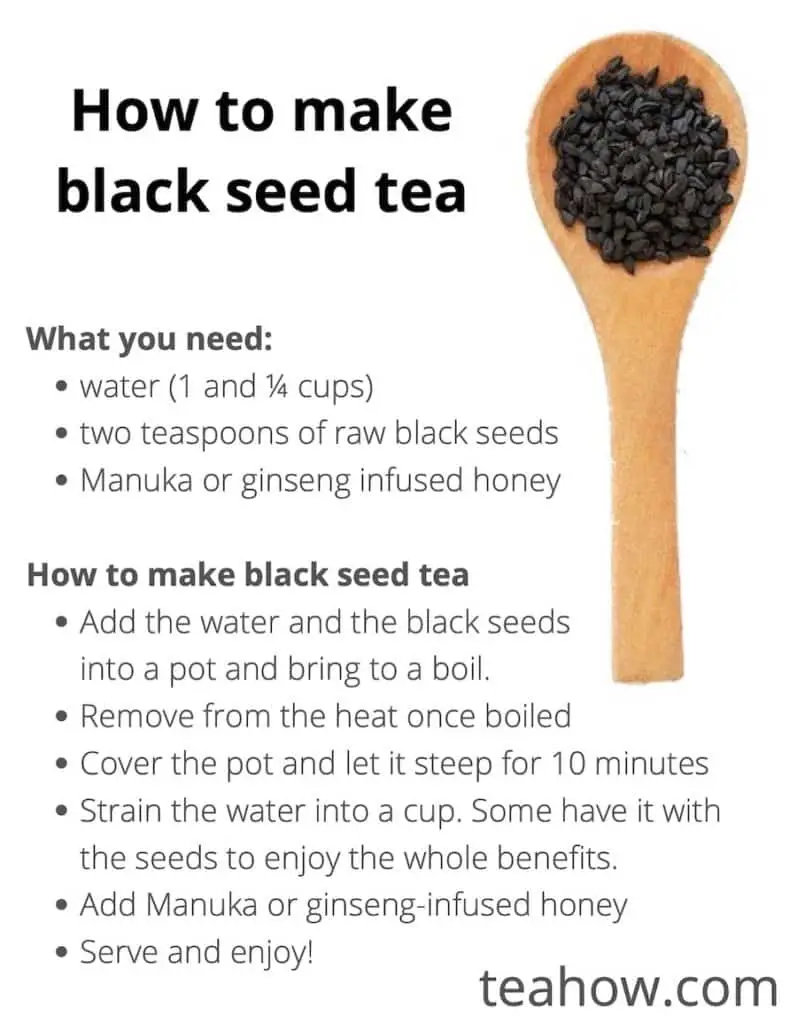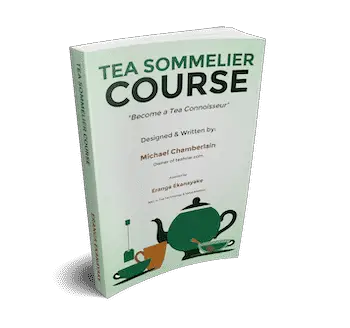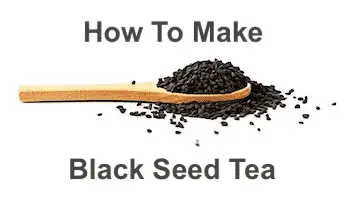Wondering how to make black seed tea? and what the benefits are. Here’s where I go into depth in explaining how to make it, the benefits and side effects, and more…
Black seed tea is a herbal tea made from Nigella seeds that is rich in antioxidants, the benefits include lowering cholesterol, combating bacterial strains and chronic conditions, and alleviating inflammation. It is also caffeine-free. It may interact with blood clotting effects and beta-blockers.
That’s the short answer, but there is more to this tea than a simple answer, so let’s get into the details, starting with the question of can you actually drink black seed oil?…
Black Seed Tea – Can you drink black seed?
Black seed can be made into a beverage following a few simple brewing steps, involving water, raw black seeds and other optional flavorings. You can create black seed tea that tastes like green/chamomile tea. People mostly drink black seed tea for its health benefits.
Black seed can also be ingested in the form of black seed oil via capsules, or applied topically direct to skin or during a massage when combined with carrier oils. It can be added to shampoos, homemade skin-care and fragrances. You can also cook and bake with quality black seed oil.
What is black seed tea?
Black seed tea is herbal tea, known as “Kalonji” tea. It’s made using black seeds or also known as black cumin seeds.
This tea is not made from the true tea plant “Camellia Sinensis”. Nor does a cup of authentic black seed tea call for the addition of true tea varieties.
Black seed tea is only an infusion of black seeds into hot water.
This is more like the herbal tea varieties or fruit infusions we are familiar with but is typically called a tea – more for simplicity.
Other similar examples include barley tea, rosehip tea, fenugreek tea, chia tea, fennel tea, coriander seed tea (also known as kotthamali).
These are all teas made by infusing different healthy seed varieties …like black seed tea.
Black seed tea is not made from the “Camellia Sinensis” so it doesn’t have the typical properties of a true tea variety.
Black seed tea is free from caffeine and tannins that usually come from true tea varieties. This also means that the flavor profile of black seed tea is different from regular teas.
Let’s get into how to make black seed tea. Make sure you have the raw black seeds available, if not then you can get black seed here on Amazon

How to make black seed tea
An authentic cup of black seed tea is simple and easy to make.
The complexity of brewing this tea comes from the different origins that use black seeds for many of their beverages.
Further with the growing health awareness of black seed tea, there are many variations on how you can brew this.
Here is how authentic back seed tea is made:
What you need to make black seed tea
- water (1 and ¼ cups)
- two teaspoons of raw black seeds
- Manuka or ginseng infused honey
You can get the raw black seeds and ginseng infused honey quickly from amazon. Or you can get Manuka honey instead.
How to brew black seed tea
- Add the water and the black seeds into a pot and bring to a boil.
- Remove from the heat once boiled
- Cover the pot and let it steep for 10 minutes
- Strain the water into a cup using a wire mesh. Some have it along with the seeds to enjoy the whole benefits.
- Add Manuka or ginseng-infused honey
- Serve and enjoy!
The taste profile of black seed tea
When classically brewed, raw black seeds will offer a strong taste with a mild flavor that mimics chamomile/green tea.
Overall, it has a taste profile similar to many other herbal teas.
But this taste profile can vary depending on what other methods you choose to brew black seed tea. In short, this taste profile can change if:
- You use black seed oil or black seed powder instead of raw black seeds
- Using other native methods to brew black seed tea that calls for black cumin, coriander, caraway, sesame, and onion.
- You use black seed tea bags that come in handy now.
So depending on what method you choose for brewing, the taste profile of black seed tea can vary.
Then, before (and while) sipping your fresh black seed tea, check out the health benefits, potential side effects, and more below.
Black seed tea using actual tea varieties
If you find the authentic way of brewing black seed tea unpalatable, you can just add black seeds to other tea varieties.
The purpose of black seed tea is mainly centered around the black seeds.
So you can simply add the same amount of black seeds into a regular cup of tea and drink that instead. This will still offer the same benefits as black seeds.
However, you may have to take in the caffeine and tannins that come along with actual tea varieties. If you want to opt for a lower caffeine alternative, go for green tea or white tea instead of black.
How much black seed tea is safe to take per day?
This answer depends on your purpose behind taking black seed tea is for.
In general, 1-3 grams of black seed powder is considered safe. However, if you’re specifically using black seed or back seed powder for its health benefits, then consult your healthcare professional.
Here’s an indication of how many cups of tea you should drink per day for popular tea varieties.
Also remember that black seeds can interact with medical conditions and medications, which I’ve covered in some part below. But again, consult your healthcare professional for further advice.
So make sure to be safe when you have a medical condition or taking it to treat one.

Benefits of black seed tea
1. Free from caffeine
As an herbal tea, or infusion, black seed tea is free from caffeine. This makes it a perfect substitute for a cup of tea that you may want to avoid for its caffeine.
Besides, back tea is easily available and is less expensive to make when compared to most other herbal tea varieties, but does of course contain caffeine.
For more about caffeine content in different teas, you can see my other articles explaining the caffeine content for white tea, Chamomile, Peppermint, Earl Grey, Darjeeling, Lotus tea, and matcha tea.
2. Packed with antioxidants
Black seed tea has a higher than usual amount of antioxidants purely from black seeds. These antioxidants can neutralize harmful free radicals and prevents oxidative damages to cells
3. May prevent chronic conditions
Black seed tea can protect against several types of chronic conditions such as cancer, diabetes, heart diseases, and obesity. Black seed tea in specific favors against pancreatic, lung, cervical, prostate, skin, and colon cancers.
4. Lowers cholesterol
Although cholesterol in some amount is essential to the body, too much cholesterol can increase your risk of heart diseases. Black seed tea can help reduce both total and “bad” LDL cholesterol.
5. Protects against bacterial strains
Black seed tea has antibacterial properties that are effective at fighting off certain strains of bacteria and bacteria-related diseases. Black seed tea also can inhibit the growth of bacteria.
6. Alleviates and suppresses inflammation
In most cases, inflammation is a normal immune response that helps protect the body against injury and infection. Black seed tea can alleviate and suppress inflammation.
This can be beneficial for cold, flu, and asthma as well. These properties help in treating oxidative stress as well.
Side effects of black seed tea
Although there are no specific side effects associated with black seed tea, there are a few risks to be aware of.
Firstly, the component “Melanthin” in black seeds can be toxic in large amounts.
Secondly, black seed tea may slow blood clotting and increase the risks of bleeding. So if you take medications that affect blood clotting, avoid black seed tea.
Black seed can slow down or stop the uterus from contracting. Black seed tea also interacts with medications such as beta-blockers.
Finally, although black seed tea is safe for pregnant or breast feeding women or among children it’s best to avoid it or take it only after a consultation with your doctor.
More tea help
I hope this has answered your questions regarding how to make black seed tea, the benefits, side effects and more.
If you’re considering black seed tea, then it sounds like you’re the tea explorer type! So you might want to consider using my Tea Sommelier Course to “take your tea a huge steep forward”. Here are more details…

Take the fast track and become a tea connoisseur
Whether for enjoyment or considering a career as a tea sommelier. This course has everything you need to enhance your tea knowledge and tea-tasting skills.
This course keeps it simple with step-by-step tea tasting and easy reference guides
For pleasure, or as a precursor to a career in the tea industry. Find out what tea sommelier actually does, their career paths, and what they earn.

Find out more about the Teahow Tea Sommelier Course!
Find out more about the Teahow Tea Sommelier Course!
